Will the stars align for peace with the ELN? ReD members Karen Arteaga Garzón, Gwen Burnyeat, Andrei Gómez-Suárez and Germán Otálora Gallego argue that the possibilities of any future negotiations with the ELN guerrilla depend on finding a solution to the tense regional geopolitics between the US, Cuba, Venezuela and Colombia.
After a brief unilateral ceasefire declared in April 2020 by the National Liberation Army (ELN), the armed conflict between Colombia’s last remaining guerrilla group and the state has resumed in full force. With the ELN attacking oil pipelines, and the Armed Forces performing air bombing campaigns on ELN camps, not only are vulnerable rural populations in regions with ELN presence under increasing humanitarian pressure, but the possibility of peace talks with the ELN looks ever more remote. Based on media reports and confidential discussions with key stakeholders, this article argues that the possibilities of any future negotiations with the ELN guerrilla depend both on regional geopolitics, in particular the relationships between the US, Cuba, Venezuela and Colombia, and on the domestic politics of each country.
Geopolitics Surrounding the ELN Insurgency
The ELN guerrilla was founded in 1964 by a group of Colombian students, trained in Havana and inspired by the Cuban Revolution, who adopted Che Guevara’s doctrine of guerrilla warfare. While their Marxist-Guevarist ideology has evolved over the years, incorporating especially aspects of Liberation Theology (represented by the iconic guerrilla priest Camilo Torres, and, later, Spanish priests Manuel Pérez and Domingo Laín), since Hugo Chávez took power in Venezuela in 1999, the ELN has developed strong affinities with Chavismo and the Bolivarian Revolution.
Many Colombians mistakenly see the ELN as the FARC’s ‘little brother’, smaller in size, significance and military might. Arguably, this error is what led to the Santos government’s failure to progress in talks with the ELN at the same time as with the FARC, believing that if the ELN saw things going well with the FARC, they would fall in line easily. However, although the objectives of the ELN and the FARC’s armed struggle were similar, they had distinctly separate projects and ideologies. It is crucial to understand how the ELN see themselves, in order to analyse the possibilities for future peace negotiations. In fact, although the Colombian state declared the ELN defunct in 1970 after ‘Operation Anorí’ which decimated ELN troops, the ELN has proved resilient to counterinsurgency efforts. In the 1980s, the ELN began to subject large oil companies to ransom, including the companies involved in the Caño Limón-Coveñas oil pipeline, a strategic US interest, and occupied territories in which large-scale energy and mining projects were located, leading to rapid growth. Although the ELN’s military capacity was weakened in the late 1990s and early 2000s when paramilitary groups targeted ELN strongholds, since implementation of the 2016 Final Peace Agreement with the FARC began, the ELN has again been growing in strength, and expanding into new territories.
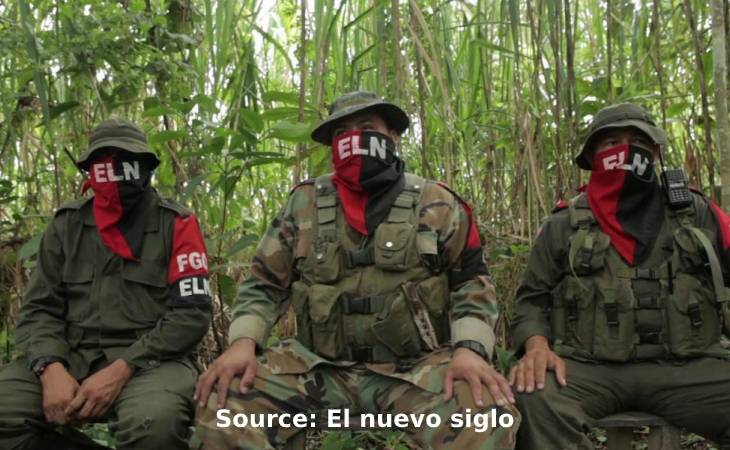
The Colombian-Venezuelan border has always been one of the ELN’s key regions of territorial control. Before Chávez took power, Venezuelan governments historically rejected ELN elements from their territory, but Chávez turned a blind eye to ELN presence in the borderlands, and allowed the ELN to consolidate as a binational Bolivarian insurgency. Today, the ELN reportedly has presence in over 13 of Venezuela’s 23 states, they control lucrative drug-trafficking routes, and they share a stake in the ongoing ideological clash against what both the ELN and Chavistas perceive as ‘US imperialism’.
Trump’s ‘Cold War’ Style Foreign Policy Toward Latin America
Since the beginning of the internal armed conflict with the FARC, the ELN and other guerrilla groups in the 1960s, successive Colombian governments have engaged in simultaneous war and peace efforts, greatly shaped by Colombia’s international relations, especially with the US. Under the Obama administration, the US played a key role in the Santos-FARC peace talks, delegating Bernie Aronson as special envoy to the Havana negotiations in 2015, and rebranding the bilateral treaty ‘Plan Colombia’ (signed in 2000 to channel US support to Colombia’s counterinsurgency efforts) as ‘Peace Colombia’, pledging 450 million dollars to help Colombia secure peace.
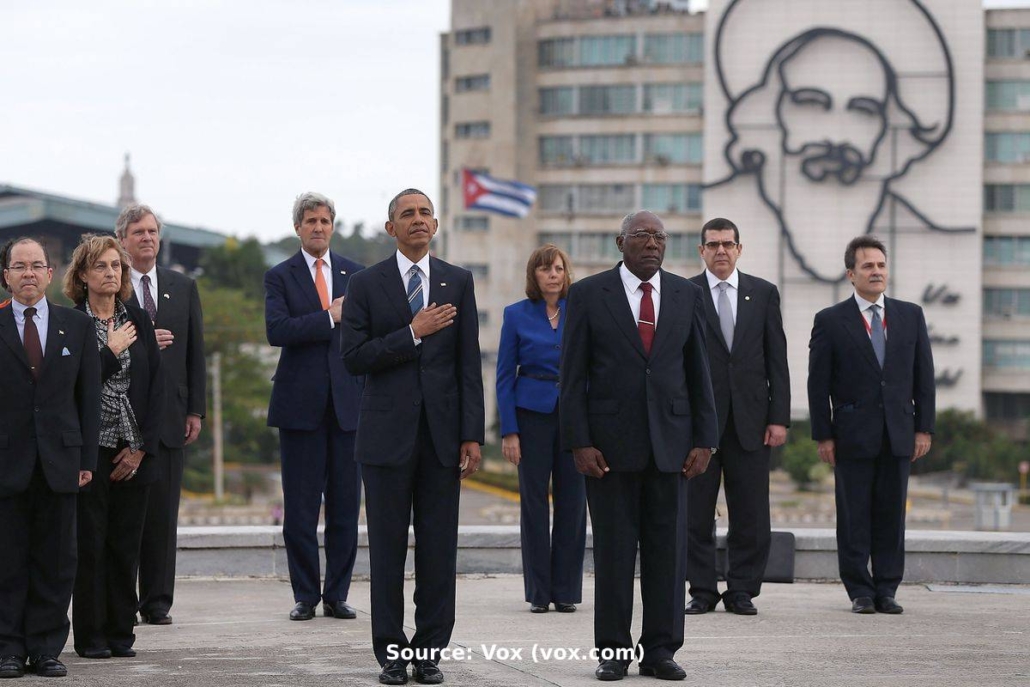
The Santos government began peace negotiations with the ELN in 2017, coinciding with Donald Trump’s arrival to the White House. The US did not participate in these talks. On the contrary, Trump began a hard-line stance toward Latin America in general, reviving Cold War foreign policy and anti-communist rhetoric. While Obama had re-established relations with Cuba, aiming to gradually normalise relations and nudge the island toward a controlled regime transformation, Trump dashed these hopes. As Florida is a key swing state for Trump’s re-election, and its population comprises politically active, right-wing Cuban-Americans, and an increasing Venezuelan diaspora which rejects Nicolás Maduro and Chavismo, US foreign policy in Latin America has increasingly focussed on staunch anti-communist policies toward Cuba and Venezuela.
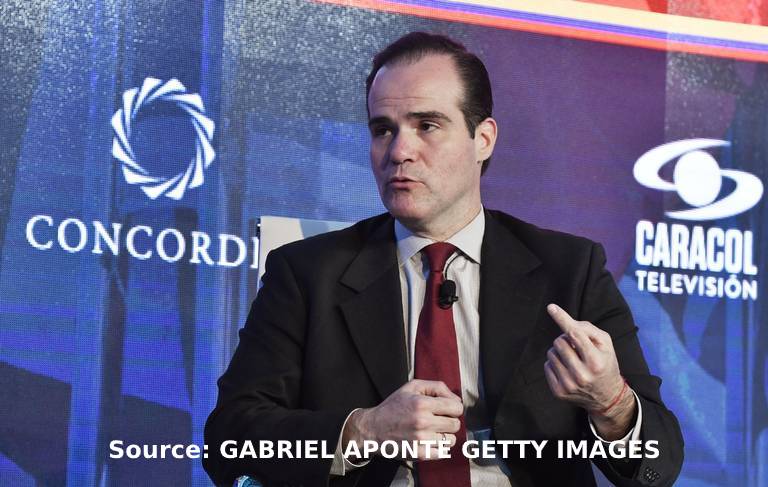
Trump’s main advisor in the National Security Council for Western Hemisphere Affairs is Mauricio Claver-Carone, close ally of Republican Senator Marco Rubio and recently nominated by Trump to direct the Inter-American Development Bank, who sees Cuba as the centre-piece of Latin American leftist politics, and has pushed Trump towards a “maximum pressure” strategy towards Venezuela. This has included sanctions against Maduro’s administration (including against PVSDA, the Venezuelan state-owned oil company), the backing of the failed coup led by Juan Guaidó from January 2019 onwards, and a highly politicised humanitarian aid envoy sent from Colombia and Brazil against the Red Cross and the UN’s advice in February 2019. The recent indictment of Maduro on drug-trafficking and terrorism charges, and the announcement of a 15 million dollar reward for information leading to his arrest — along with the indictment of 14 of his top aides— is another example of the escalation of the US approach towards Venezuela.
Since taking office, Trump’s policy toward Colombia has been heavily focussed on two issues: Venezuela and drugs, both synergetic with the Duque government’s dominant narratives since its election campaign. Peace has been completely side-lined from US-Colombia relations. Trump’s anti-narcotics agenda centres on the increase of coca crops in Colombia, which reached 154,000 hectares in 2019. The first American state official Duque met on assuming his presidency, in September 2018, was Trump’s deputy director of the Office of National Drug Control Policy; and at the first meeting between Duque and Trump, Trump pressured Duque to spray coca crops with glyphosate, and has continued since to insist on this. Duque has recently stated his intention to implement a return to glyphosate spraying, despite the social and environmental impacts, the Colombian Constitutional Court’s legal limits on the use of glyphosate in coca eradication, the advice of the World Health Organisation, and much social protest against aerial spraying from campesinos, cocalero movements, and pro-peace organisations who call for implementation of point four of the Havana Peace Agreement, predicated on voluntary crop substitution rather than forced eradication. In May 2020, the American Embassy in Bogotá announced that a US Army Unit of 800 troops would be deployed to Colombia to support intelligence and counter-narcotics operations, further consolidating the direction of US policy toward Colombia.
The Duque-Trump Affinities: An Obstacle to Peace with the ELN
The prospects for negotiations between the Duque government and the ELN currently seem trapped by the anti-communist-cum-‘narco-terrorism’ rhetoric shared by Duque, Trump, and their respective political support bases. Duque, in his electoral campaign, promised to take a hard-line stance toward the ELN and make substantial modifications to the Peace Agreement with the FARC. When he took office in August 2018, Duque announced an evaluation of the progress that the Santos government had made in negotiations with the ELN, and kept the ELN negotiation team waiting for six months in Havana. Between August 2018 and January 2019, Duque’s High Commissioner for Peace, Miguel Ceballos, used back channels to try to persuade the ELN to meet Duque’s conditions for negotiation: ending criminal activities and releasing all hostages.
In January 2019, the ELN bombed a Policy Academy in Bogotá, killing 22 cadets. Duque formally renounced peace negotiations with the ELN, and requested that Cuba, which had been a guarantor of the incipient peace process, as well as a key ally in the Santos-FARC peace talks, hand over the ELN negotiation team. He requested an Interpol arrest warrant against the ELN delegates, urging Cuba and Norway, another guarantor, to ignore protocols they had signed with the Santos administration guaranteeing the safe return of the ELN negotiators to the Colombian jungle if peace talks broke down.
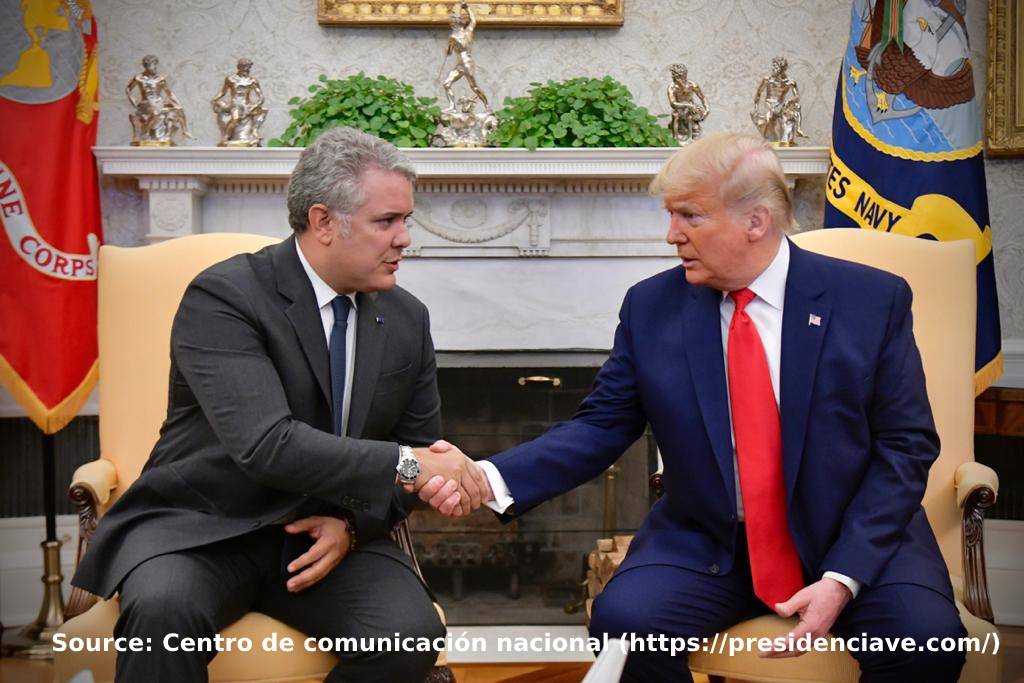
In May 2020, the US Secretary of State added Cuba to the list of states that do not cooperate fully with US counterterrorist efforts, using ELN presence in Venezuela and Cuba as a justification, and this was celebrated by the Miguel Ceballos, who emphasised Cuba’s refusal to hand over the ELN negotiators. In response, the FARC political party decided to cease participation in the Commission for Monitoring, Promoting and Verifying the Implementation of the Final Agreement (CSIVI), the key bilateral (government-FARC) body charged with maintaining dialogue about ongoing issues in implementation, which indicates their grave concern regarding the Duque-Trump allied policies for the future sustainability of peace in Colombia; a concern shared by many observers, including analysts at Embrace Dialogue.
The Interplay Between Domestic and International Politics in the Americas
With the arrival of Trump to the US, Jair Bolsonaro to Brazil, and Iván Duque in Colombia, the region has seen a marked shift to the right, with countries like Bolivia and Ecuador aligning themselves unexpectedly with Trump’s foreign policy. The Venezuelan crisis has weakened Cuba’s position in the Western Hemisphere, and strengthened the Cuban right in Miami. Maduro has so far withstood Guaidó’s opposition and US-Colombian attempts to destabilise his regime, he maintains control of the army, and continues to enjoy widespread public support. However, the nation is split between Chavistas and the opposition. Millions have fled the country, though many have returned after encountering harsh conditions in Colombia and elsewhere in South America. The lack of diplomatic relations between Venezuela and Colombia has led to the border becoming a no-man’s land, with non-state armed actors proliferating.
Trump is now coming to the end of his first term in office, and his electoral campaign is now in full swing, with his first rally to take place in Tulsa, Oklahoma in June, despite the risk of mass infection in the context of the COVID-19 pandemic. Trump’s levels of support are below 40%, having been negatively affected by his handling of both coronavirus and the killing of George Floyd, and he will have to work hard to be re-elected. He is dependent on Claver-Carone and Rubio, and their anti-communist Latino electoral bases, which means that his Cold War style rhetoric and foreign policy remain major cornerstones of his electoral campaign.
In Colombia, support for Iván Duque, who is now half-way through his presidential term, is waning. His mishandling of the implementation of the Peace Agreement turned moderates toward opposition, while also losing him support from radical sectors of his political coalition, as he did not undermine the peace process completely. With the mass demonstrations in November 2019, Duque’s popularity dropped to record lows of less than 30%. While this has seen a recent uptick due to perceptions that he has handled coronavirus well, he still only enjoys 54% approval ratings. Duque’s political capital rests overwhelmingly on the support of ex-President (2002-2010) and today Senator Álvaro Uribe, whose priority now is to ensure the Democratic Centre party retains power and is re-elected in the next presidential elections of 2022. Uribe’s recent support for negotiations with the ELN is arguably part of this electoral bid.
Could the Geopolitical Stars (and Stripes) Align for Peace?
The Santos-FARC peace talks led to an agreement largely thanks to the alignment of the geopolitical stars: Obama was in the White House and looked favourably on the peace process, as did the EU and the UN, and Castro and Chávez provided support from the Latin American left and encouraged the FARC to negotiate peace. With the arrival of Trump and Bolsonaro, the deaths of Castro and Chávez, and the legitimacy crisis of the Maduro regime, the geopolitics look starkly different. The region seems polarised along old Cold War-style ideological splits: on the one hand, Cuba, Venezuela, and the ELN in Colombia champion twenty-first century socialism; on the other, the US, Colombia, Brazil, and the right-wing Cuban and Venezuelan diasporas are entrenched in an ever-more radicalised neo-conservativism.
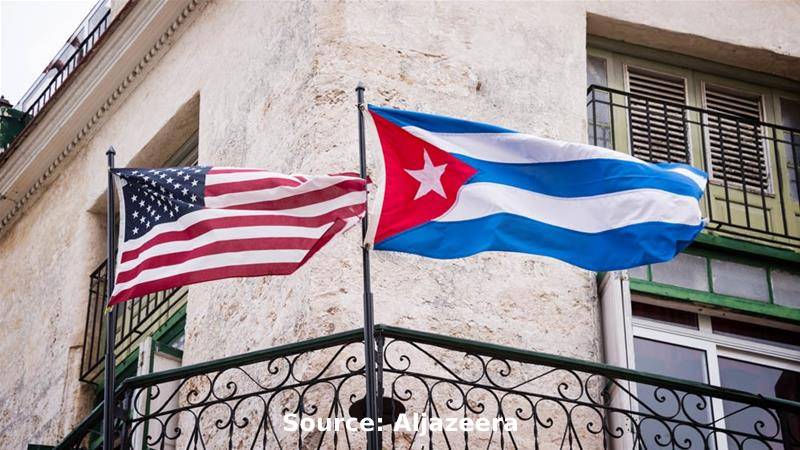
The chances for a negotiated solution to the armed conflict with the ELN depends on a change in this polarisation, which, in turn, hinges on the unfolding politics of these four countries and their international relations over the next two years, particularly on the presidential elections of the US and Colombia. If Joe Biden is elected to the White House, he would likely return US foreign policy toward the Obama doctrines, potentially normalising trade and diplomatic relations with Cuba, making more possible a diplomatic solution to the Venezuelan crisis over a military regime change, and strengthening bipartisan support to comprehensive approaches to peacebuilding in Colombia, instead of privileging anti-narcotics and counter-terrorism, and looking more favourably on possible negotiations with the ELN. A diplomatic solution to the Venezuelan crisis is crucial for addressing the armed conflict with the ELN. Given the increasingly bilateral nature of the ELN’s troops and ideological identity narratives, this conflict can only be resolved in tandem with solving the Venezuelan issue.
A Biden White House would have a notable impact on the Duque administration, as Colombian governments are usually pragmatically acquiescent to US foreign policy. In this scenario, moderate sectors within the Duque coalition will grow in strength, pulling the government away from its more radical elements, to prevent an easy victory for defenders of the Peace Agreement in 2022. In these presidential elections, peace will be understood as the protection of the lives of vulnerable populations – from both violence and COVID-19. Key issues on the table will be the killings of social leaders, implementation of the 2016 Peace Agreement with the FARC, and solving the armed conflict with the ELN.
If Trump is re-elected, however, it does not foreclose the possibility of peace. Once he has secured his second term, he will no longer have to worry about pandering to his Florida bases, and his priorities, fickle and rarely consistent ideologically, may take new forms. If, for example, he saw strategic economic interests in Venezuela or Cuba, it is not impossible that he could take a more constructive direction in regional foreign policy.
In either case, the forthcoming conjuncture offers a new window of opportunity for a regional dialogue to synchronise foreign policy agendas, and it is important to project viable solutions to the unfolding regional crisis. In the 1980s, the “Contadora Group”, launched by Colombia, Mexico, Panama and Venezuela, sought to create a regional dialogue to solve the Central American crisis of the military conflicts in El Salvador, Nicaragua and Guatemala. One possible pathway for addressing the current geopolitical stalemate could take inspiration from this, and open a regional dialogue between Cuba, Colombia, Venezuela and the US. Key actors in such a process could include the US Institute for Peace and the High Commissioner for Peace in Colombia. It remains to be seen whether the stars will align to close once and for all the recycling of political violence in Colombia, and its spill-over into neighbouring countries.

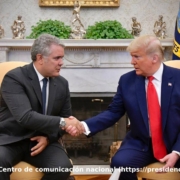


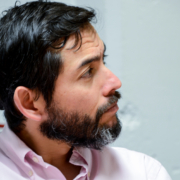
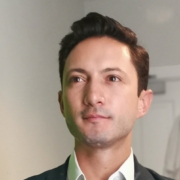


Leave a Reply
Want to join the discussion?Feel free to contribute!